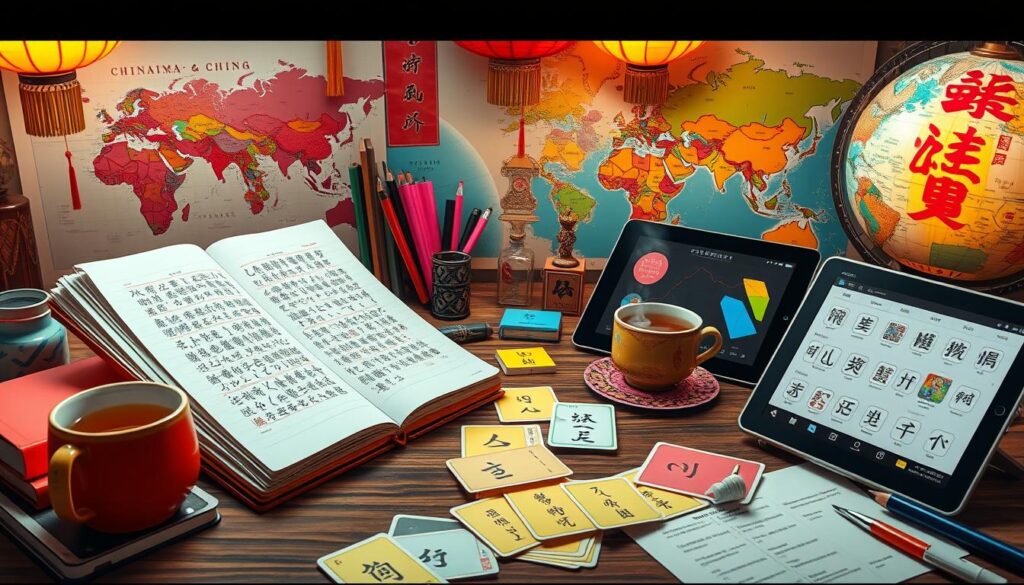Are you thinking about learning a new language? The big question is: Should you learn Mandarin or study Korean? Picture yourself making deals in Beijing or enjoying Seoul’s lively entertainment. It’s crucial to think about what you really want from this experience.
Considering Mandarin classes could be wise because over 900 million people speak it. On the other hand, joining Korean classes is tempting too. This is because the Korean Wave, or Hallyu, is becoming popular worldwide. Plus, there are 75 million Korean speakers globally. Your choice should be based on your personal goals and which culture you find more interesting.
In the United States, many people speak Chinese. This can make practicing Mandarin easier without going far. But, don’t look past useful Korean resources like “Talk To Me In Korean” (TTMIK). It might sway you towards learning Korean. Whichever language you pick, remember that regular practice is key. Let your enthusiasm and love for the culture guide you.
Evaluating Your Language Learning Goals
Choosing to learn Mandarin or the Korean language isn’t just about words and grammar. It’s also about matching your goals with the culture and usefulness of the language.
Understanding Cultural Engagement and Interest
Your interest in learn Mandarin or Korean lessons often comes from cultural attractions. K-Dramas might draw you to the Korean language. Meanwhile, China’s history and economy might lead you to mandarin lessons.
This initial attraction can boost your motivation and enjoyment while learning.
Assessing Language Utility and Career Opportunities
Both the mandarin language and the Korean language offer unique career benefits. Understanding Mandarin can open doors in international business and diplomacy. Korean proficiency can help in technology and entertainment fields.
When choosing a language, think about these career paths. For more details, check Language Yard.
Determining the Time Commitment for Language Proficiency
Gaining mastery in either language takes commitment. Learn Mandarin, and you will need to learn about 3,000 characters. Korean language‘, with its 24-letter alphabet, might be quicker to pick up.
The Foreign Service Institute categorizes both as challenging, needing around 2200 hours of study for fluency. This commitment is a big factor in your decision for mandarin lessons or korean lessons.
| Language | Alphabet/Characters | Hours for Basic Fluency | Career Opportunities |
|---|---|---|---|
| Mandarin | ~3,000 Characters | 2200 | Business, Diplomacy |
| Korean | 24 Letters (Hangul) | 2200 | Technology, Entertainment |
Your choice between mandarin lessons and korean lessons should depend on your interests, time, and career context. Reflect on these to set realistic goals and choose a path that fits your aspirations.
Deciphering the Linguistic Complexities: Mandarin vs Korean
Starting to learn a new language opens up new worlds. When picking between Mandarin lessons and Korean classes, it’s important to understand their language complications. Both languages offer their own challenges and rewards, suiting different kinds of learners.
Analyzing Phonetics and Pronunciation Challenges
Korean lessons will show you Hangul’s 14 consonants and 10 vowels. This system is unique and might be hard to pronounce for some. On the other hand, Mandarin classes present a challenge with four main tones. These tones can change a word’s meaning, so you need to get the tones right to be understood.
Exploring Grammar and Vocabulary Differences
Mandarin uses a subject-verb-object structure, similar to English. This might be easier for English speakers compared to Korean’s subject-object-verb setup. Besides, learning Mandarin means getting to know thousands of Hanzi characters. Korean, though, has a simpler alphabet, which might seem less daunting.
Comparing Character and Alphabet Systems
The complex Mandarin logograms are a sharp contrast to Korean’s simpler Hangul. This makes Korean seem easier to learn at first. But becoming good at any language takes effort and practice.
Considering the Prosody Elements: Tones vs Pitch Accent
Mandarin is known for its tonal nature, unlike Korean’s non-tonal, phonetic system. For many, deciding between a tonal language like Mandarin and a phonetic one like Korean is a big decision. Mandarin requires mastering subtle voice changes that affect meaning.
Navigating Written and Spoken Nuances
Both Mandarin and Korean have rich written and spoken forms. Whether choosing Mandarin lessons or Korean classes, each language opens doors to new cultures. For more help in making a choice, check out this resource.
| Feature | Mandarin | Korean |
|---|---|---|
| Alphabet Type | Logographic (Hanzi) | Phonetic (Hangul) |
| Grammar Structure | Subject-Verb-Object | Subject-Object-Verb |
| Tones | Four main tones | Non-tonal |
| Key Vocabulary Origin | Sino-Tibetan roots | Sino-Korean words |
| Speaking Proficiency Hours | 2200-2500 hours | 600-900 hours |
Whether you’re drawn to Mandarin’s complex tones or Korean’s clear phonetics, each language has its own appeal. The choice between Mandarin classes or Korean classes depends on what suits you best. It’s about your personal learning style and interests in language.
Motivation in Language Acquisition: The Role of Personal Interest
When deciding whether to study mandarin language or korean language, it’s essential to consider your personal interests. They greatly influence your motivation and success in learning a new language. If you love Korean dramas or enjoy Chinese literature, this passion lays a solid foundation. It drives persistent learning and deepens your understanding of the culture.
Enjoying the journey is key, as intrinsic motivation boosts both fun and effectiveness. A study on NCBI shows that learners driven by personal interest are more motivated long-term. This motivation is vital for maintaining language skills over time.
Research within the mandarin language and korean language learning communities provides some interesting insights:
| Statistic | Details |
|---|---|
| Retention Rates | Retention rates in universities for Chinese language learners can be as low as 20%, highlighting the challenge of long-term engagement. |
| Intrinsic Motivation | Learners who viewed their language achievements as fluent or experienced scored higher in both intrinsic motivation and creativity, notably important for beginners and intermediate learners. |
| Ethnic Composition | 90% of the ethnic composition of students learning Chinese includes Asian and Asian-American students, which may influence cultural connections and motivation. |
This data highlights how crucial personal interest is in language learning success. As you choose between study mandarin or study korean, pick what excites you. This makes learning fun and enhances your grasp of the language in various situations.
Choosing a language goes beyond immediate gains. It’s about matching your aspirations with cultural and linguistic opportunities. Let your passions lead your learning journey. Discover how each new word and phrase reveals a new world of possibilities.
Cultural Immersion and Language Practice Opportunities
Deciding to learn Mandarin or Korean requires diving into the culture and practicing the language often. Talking with native speakers and experiencing local customs can improve your language skills better than just studying from books. This method helps you understand the language and culture on a deeper level.
Looking for the best way to immerse yourself? Check out structured learning programs around the world. The Korean International Summer Language Program (KISLP), for example, combines language classes with cultural activities during summer. You’ll get 100 hours of Korean language classes and 40 hours of cultural experiences. This balanced approach helps you learn Korean and understand Korea’s cultural identity.
If Mandarin interests you, Yantai University in China has semester-long courses. You’ll attend four hours of Mandarin classes every day. The courses focus on improving your overall Mandarin skills through active learning and engaging with the community.
- Community Engagement: Being part of local communities through volunteering or daily interactions is key to practicing the language realistically.
- Media Consumption: Regularly watching films, reading books, and listening to podcasts in Mandarin or Korean familiarizes you with the language in various contexts, making learning easier.
The cultural immersion these programs provide not only boosts your language skills but also opens up career opportunities. Knowing Korean or Mandarin is greatly valued, especially since many Korean companies do business with China and require Mandarin. Likewise, studying in China often requires Mandarin skills. This shows how language skills can benefit your career, not just personal growth.
Looking into immersion programs can be more affordable through scholarships, like the Judith Ehm Foundation Fellowship. It offers significant support for students in the KISLP.
| Program | Hours of Instruction | Cultural Activity Hours | Credit Units |
|---|---|---|---|
| KISLP Summer | 100 | 40 | 2 |
| KISLP Semester | 225 | 24 | 4 |
| Mandarin at Yantai University | 360 | Varied | Course based |
Whether you’re learning Mandarin or Korean, immersive learning speeds up your progress and enriches your understanding of the culture. It turns every challenge in your learning journey into a rewarding experience.
The Resources and Tools Available for Learning Mandarin and Korean
Starting to learn Mandarin or Korean is exciting. There are many resources for different learners. Online and community options make learning these languages rich and diverse.
Language Learning Platforms and Applications
Many online tools help improve your Mandarin or Korean. For example, 90 Day Korean helps you speak Korean in 90 days. Chinese Zero to Hero and Yoyo Chinese offer courses based on the HSK tests. Apps like “Scripts” and “Quizlet” give you short daily lessons and big sets of learning material.
Community Classes and Language Exchange Programs
Community classes offer direct interaction. Sites like Italki and Rype introduce you to teachers for one-on-one lessons. Institutions like Seoul National University have online courses to learn Korean basics.
Utilizing Media for Complementary Learning
Adding media to your studies helps a lot. Watch videos from the “90 Day Korean Official Youtube Channel” or FluentU to see Mandarin and Korean in action. This makes learning practical and fun.
Advice from Polyglots and Language Experts
Learning tips from experts is useful. They stress practicing often with tools like Du Chinese. This helps decide if self-study or classes like those from Mandarin Blueprint are better for you.
Effectiveness of Self-Study vs. Structured Learning
The choice between self-study and courses depends on your goals and time. Self-study tools like “Trainchinese” and courses from Rosetta Stone are available. They support your learning path, whether you study alone or with a teacher.


